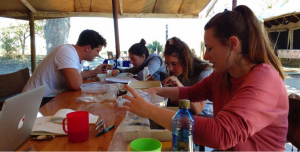My name is Beth and I’m a MSc Water: Science and Governance student at the Department of Geography, King’s College London. I have just returned from an interdisciplinary fieldtrip to the Okavango Delta, Botswana, in partnership with the PLuS Alliance, which gave us the chance to work in collaboration with students and staff from UNSW Sydney and Arizona State University. I got to experience ‘the science’ part of environmental management in a different country’s context; conducting aquatic, riparian and terrestrial-based ecological surveys, collecting water quality data and learning a lot from the Australian students’ various ecology and biology backgrounds.
The most enjoyable part of the trip for me, besides the stunning safari drives and elephants, was ‘the governance’ aspect of the trip. We held a debate over the opportunities and challenges of managing the Okavango river basin from the perspective of each basin state, after lectures from UNSW’s Dr Richard Kingsford about adaptive management and King’s Dr Naho Mirumachi on the role of power in transboundary governance. It was rewarding to hear the themes we had discussed then reflected in a guest talk from Dr Ebenizário Chonguiça from the Okavango River Basin Water Commission (OKACOM).
Throughout the trip, our group were introduced to many stakeholders in the river basin. I’m now in the process of developing a podcast of conversations with the members of Botswana Predator Conservation Trust and Elephants Without Borders, to a former farmer, member of the Kalahari Conservation Society and past Permanent Secretary of the Botswanan Ministry of Environment, Wildlife and Tourism. It was great to learn about the river basin in situ, to get an insight into the effects of human development on the valuable wetland ecosystem, how these views of development are contested, and how we use science to monitor the effects. It has helped me to explore ideas for my dissertation next term, such as exploring the trade-offs between maintaining a free-flowing river system and seeking transboundary cooperation to share-benefits from the basin’s development.
This research trip comes after another water-orientated experience where I worked with WWF-UK as their Freshwater Science and Policy intern for three months at the start of 2017. The internship really appealed to me as a parallel to the science and governance elements of my course at Kings. It gave me a working insight into how an international organisation uses fieldwork, research and multidisciplinary expertise to become a knowledge producer and leading authority on environmental issues, and go on to empower communities and influence policy makers. I assisted in researching for, and drafting a primer on water infrastructure, and gave a talk on the impact of dams in front of many delegates from other national and international organisations.
All these experiences in my first year as a part-time student at King’s have given me real insight into many current water issues and how these can be tackled in a future career in water. After working alongside world class water experts and academics, seeing science and policy come together whilst working at WWF-UK or seeing it in the field in Botswana, it has been inspiring. I hope to go on to work in a research or policy role that makes a difference on the ground to people and the environment, wherever in the world that may take me.

